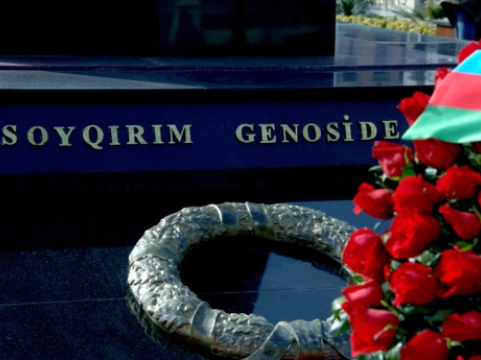Romanian party denounces Khojaly genocide

By Sara Rajabova
The Romanian Democratic Liberal Party's parliament group has issued a statement on the Nagorno-Karabakh conflict condemning the Khojaly genocide committed against Azerbaijanis by Armenians during the 1990s war.
The statement by the parliament group, represented in the Chamber of Deputies, the lower house of Romania's bicameral parliament, was announced in parliament by MP from the party Lucian Militaru, the Azerbaijani Embassy in Romania said on Thursday.
Militaru said the killing of civilians by the Armenian armed forces in the town of Khojaly of Azerbaijan in 1992 on the grounds of nationalism and ethnic discrimination should be considered by the international community as a crime against humanity, and the world community should regard this as a threat to humanity, international security and peaceful co-existence of nations.
The MP touched on the history of the Nagorno-Karabakh conflict and noted that 20 percent of Azerbaijani territories are currently under Armenian occupation.
Militaru also noted the need for demanding implementation of the four UN Security Council resolutions calling for a full and unconditional withdrawal of the Armenian troops.
According to him, given all of the aforementioned, it is important to recognize and support internationally the territorial integrity, sovereignty and inviolability of the borders of Azerbaijan by member countries of the international community.
Besides, Arkansas recently became the latest U.S. state to recognize the Khojaly genocide. Following the House of Representatives, the Arkansas Senate labeled the Khojaly massacre as an act of genocide.
The Senate resolution No SR6, proposed by Senator Brian King, became the guarantee of full recognition of the Khojaly genocide by the Arkansas legislative body. Arkansas is the second state after New Mexico where both houses of parliament have adopted resolutions recognizing the Khojaly tragedy.
The U.S. states of Texas, New Jersey, Georgia and Maine have also recognized the Khojaly genocide.
Commemoration of genocide
The Action Plan over the 21st anniversary of the Khojaly genocide has been approved in accordance with an order of the head of the Presidential Administration of Azerbaijan.
The action plan includes the laying of a wreath to the monument to the Khojaly genocide victims in the Khatai district of the Azerbaijani capital Baku, and in Nafatalan city; holding press conferences, commemorative ceremonies, etc. in embassies, representative offices and diaspora organizations of Azerbaijan; publishing materials in foreign media and broadcasting TV and radio programs devoted to the Khojaly genocide.
According to the document, commemoration events, photo exhibitions, meetings with eyewitnesses of the tragedy will be held in the institutions and organizations, exhibition halls, secondary and higher educational institutions; documentaries and feature films dedicated to the fight for national freedom will be screened.
With the participation of heads of government agencies, members of parliament and representatives of the intelligentsia, assistance will be provided to the people who hail from Khojaly and families of the martyrs, who are settled across Azerbaijan, including Baku, Ganja and Sumgayit, the country's largest cities, as well as in a number of the country's regions.
On the eve of the Khojaly anniversary materials about the genocide will be posted on the Internet. The media will extensively cover the tragic events of February 1992.
On February 25, the first lessons in educational institutions will be devoted to the tragedy, and on February 26 at 5 p.m. the victims of Khojaly genocide will be commemorated with a moment of silence throughout the country.
The Khojaly massacre is one of the most heinous and bloodiest events of the 20th century. Late into the night of February 25, 1992, the town of Khojaly came under intensive fire from the town of Khankendi and Askeran already occupied by Armenian armed forces. At night the Armenian forces supported by the ex-Soviet 366th regiment completed the surrounding of the town already isolated due to ethnic cleansing of the Azerbaijani population of the neighboring regions. The joint forces occupied the town, which was ruined by heavy artillery shelling.
Thousands of fleeing civilians were ambushed by Armenian forces. Punitive teams of the so-called NK defense army reached the unprotected civilians to slaughter them, mutilating and scalping some bodies. In just a few hours, 613 civilians were killed, including 106 women, 70 elderly and 83 children. A total of 1,000 civilians were disabled. 56 people were killed with outrageous brutality, eight families were totally exterminated, and 25 children lost both parents, while 130 children lost at least one parent, in what became the most brutal punishment of civilians during the three years of the conflict's military phase. Moreover, 1,275 innocent people were taken hostage, while the fate of 150 remains unknown.
